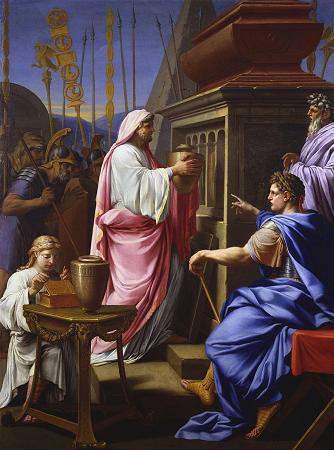Claudius (-10 - 54). Claudius was Roman emperor from AD 41 to 54. Born to Drusus and Antonia Minor at Lugdunum in Roman Gaul, where his father was stationed as a military legate, he was the first Roman emperor to be born outside Italy. Nonetheless, Claudius was an Italic of Sabine origins and a member of the Julio-Claudian dynasty. Because he was afflicted with a limp and slight deafness due to sickness at a young age, his family ostracized him and excluded him from public office until his consulship, shared with his nephew Caligula in 37. Claudius' infirmity probably saved him from the fate of many other nobles during the purges of Tiberius' and Caligula's reigns; potential enemies did not see him as a serious threat. His survival led to his being declared emperor by the Praetorian Guard after Caligula's assassination, at which point he was the last male of his family. Despite his lack of experience, Claudius proved to be an able and efficient administrator. He expanded the imperial bureaucracy to include freedmen, and helped to restore the empire's finances after the excess of Caligula's reign. He was also an ambitious builder, constructing many new roads, aqueducts, and canals across the Empire. During his reign the Empire started its successful conquest of Britain. Having a personal interest in law, he presided at public trials, and issued up to twenty edicts a day. He was seen as vulnerable throughout his reign, particularly by elements of the nobility. Claudius was constantly forced to shore up his position; this resulted in the deaths of many senators. These events damaged his reputation among the ancient writers, though more recent historians have revised this opinion. Many authors contend that he was murdered by his own wife. After his death in 54, his grand-nephew and legally adopted step-son Nero succeeded him as emperor. His 13-year reign would not be surpassed by any successors until that of Domitian, who reigned for 15 years. He was a descendant of the Octavii Rufi, Julii Caesares, and the Claudii Nerones. He was a step-grandson and great-nephew of Augustus. Tiberius was his father's brother. Through his brother Germanicus, Claudius was an uncle of Caligula and a great uncle of Nero. Through his mother, Antonia Minor, he was also a grandson of Mark Antony and Octavia Minor. Claudius was born on 1 August 10 BC at Lugdunum. He had two older siblings, Germanicus and Livilla. His mother, Antonia, may have had two other children who died young. His maternal grandparents were Mark Antony and Octavia Minor, Augustus' sister, and he was therefore the great-great grandnephew of Gaius Julius Caesar. His paternal grandparents were Livia, Augustus' third wife, and Tiberius Claudius Nero. During his reign, Claudius revived the rumor that his father Drusus was actually the illegitimate son of Augustus, to give the appearance that Augustus was Claudius' paternal grandfather. In 9 BC, his father Drusus unexpectedly died on campaign in Germania, possibly from illness. Claudius was then left to be raised by his mother, who never remarried. When Claudius' disability became evident, the relationship with his family turned sour. Antonia referred to him as a monster, and used him as a standard for stupidity. She seems to have passed her son off to his grandmother Livia for a number of years. Livia was a little kinder, but nevertheless often sent him short, angry letters of reproof. He was put under the care of a former mule-driver to keep him disciplined, under the logic that his condition was due to laziness and a lack of will-power. However, by the time he reached his teenage years his symptoms apparently waned and his family took some notice of his scholarly interests. In AD 7, Livy was hired to tutor him in history, with the assistance of Sulpicius Flavus. He spent a lot of his time with the latter and the philosopher Athenodorus. Augustus, according to a letter, was surprised at the clarity of Claudius' oratory. Expectations about his future began to increase. His work as a budding historian damaged his prospects for advancement in public life. According to Vincent Scramuzza and others, Claudius began work on a history of the Civil Wars that was either too truthful or too critical of Octavian, then reigning as Augustus Caesar. In either case, it was far too early for such an account, and may have only served to remind Augustus that Claudius was Antony's descendant. His mother and grandmother quickly put a stop to it, and this may have convinced them that Claudius was not fit for public office. He could not be trusted to toe the existing party line.
more...










